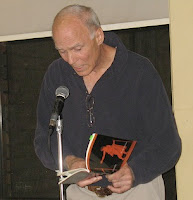 Peter Richardson’s first book of poetry, A Tinkers’ Picnic (1999) was shortlisted for the Gerald Lampert Award. His second book, An ABC of Belly Work (2003) was a finalist for the Acorn-Plantos Award.
Peter Richardson’s first book of poetry, A Tinkers’ Picnic (1999) was shortlisted for the Gerald Lampert Award. His second book, An ABC of Belly Work (2003) was a finalist for the Acorn-Plantos Award.Richardson's third book Sympathy for the Couriers (2008) recently won the QWF's A.M. Klein Prize for Poetry. For over 24 years, he was employed by Air Canada as a ramp worker. Retired, he now lives in Gatineau, Quebec with his wife and daughter.
The following interview was conducted by e-mail.
CS: Sympathy for the Couriers includes some of your most ambitious dramatic monologues. What is it about talking in other voices that you like? Do the voices visit you, or do you go looking for them?
PR: I wouldn’t say I go looking for them, unless you can call fifteen or twenty minutes of free-writing before breakfast a way of sending out a psychic casting call. I either write from an emotion and get a line I like that is declamatory and evocative, or I start with something visual-an object or scene. For instance with the Professor Basso poem, I had the image of snow blowing by a monastery window. That’s it. There was a line that went with the image which later disappeared from the poem. But I had a visual clue. And then, much later, I had this man running and sliding down a ravine in blowing snow. With the monastery already in the picture, I began to see who this person could be through a series of longish lines, each asking to be about the same length. Line length is an important ingredient in developing a scenario. Or, at least, that has been my experience.
So I work with a personality which declares itself in a line and then opens up over further lines, or I’m given a picture. (I do like writing about objects too, which is another worthy trajectory to take, partly because objects can sometimes be connected with people we know.)
CS: Humour is a big part of your poetry. Do you think Canadian poems are too earnest?
PR: That’s a tricky question, because if a poem is well-written, it can be as earnest as it wants to be and it will get a lot of readers on board. Jason Heroux gets away with it in a recent poem of his called “Lost Forest” because he’s written a fine haunting poem. But I’ve noticed that when it comes to nature poems, there’s a “high-in-the-pulpit-hand-wringing” school of lyricists, who first have do a kind of public obeisance before nature before they can get on with their text. I find that irritating. Fortunately, there are plenty of writers who don’t fall into that trap. Patrick Warner is an example. Curiously, he is also an intelligently funny poet.
As for humour, if it’s innate and not pasted on, if it’s really a part of your sensibility, then I think it can tap into a wide emotional spectrum. There are so many kinds of humour, and I’m a fan of most of them. In our family, when I was growing up, wry, sarcastic and cynical humour were big favourites. My parents, of course, weren’t big on the cynicism but it sometimes drew my brothers and I to hilarious heights. How could we not be cynical when we saw Vietnam war coverage on the CBS which would segue into ads for Alpo dog food? Absurdist humour, on the other hand, was acceptable at the dinner table because as a family, we were big on writers like James Thurber and A.J. Liebling. And when I think of it, different types of humour do appear in plenty of my poems. They are a defence, I guess, against a prating, heavy-browed, Archbishop-Sheen-like approach to poetry which sends me in the other direction. But they are also a reflection of what I think is worth celebrating at some sub-basement level of my personality. That said, though, I believe in the elegy and in plenty of other kinds of serious poetry.
CS: How would you describe the contemporary Canadian poetry scene to one of the baggage handlers you used to work with?
PR: Could I get them to sit still long enough to talk for even a minute on that subject? But here I’m short-changing an extremely varied and surprisingly smart group of people from whom I was able to learn a lot and for years. I guess I would do a thirty-second sound bite. I’d say: “The Canadian poetry scene is a bunch of rabid dogs who mean well and get along well within their own tainted kennels. And in their favour, they represent about every type of poetry being written. Sometimes they make magnanimous gestures amongst themselves and reach across aesthetic lines to celebrate others who do not necessarily buy their way of seeing a lyric. But they’re still in the process of building something remarkable. They’re not there yet, which explains why you guys don’t browse in the poetry section of Chapters. You might be missing a few revelatory gems, but generally, I can’t fault you for sticking to thrillers.”
CS: Can you come up with one thing about the writing life that drives you batty?
PR: Nothing that wouldn’t sound like I was carping and I’m in a good mood today.
No comments:
Post a Comment